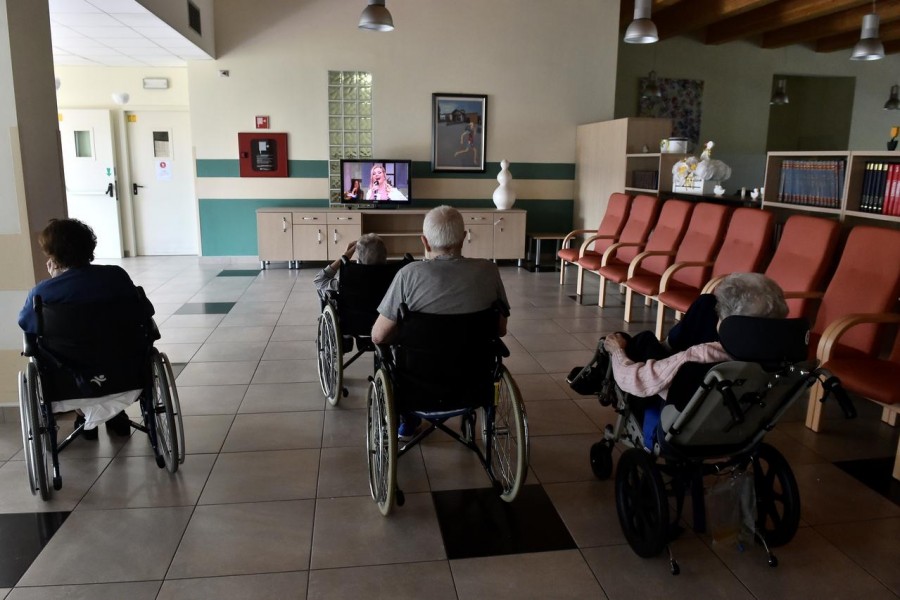
Published :
Updated :

Italy’s nursing homes, ravaged by the coronavirus pandemic which claimed the lives of thousands of residents, face financial pressures that threaten to put many out of business and create a fresh elderly care crisis.
With costs escalating because of the pandemic and new admissions to care homes blocked in regions including Lombardy, the epicentre of Italy’s coronavirus outbreak, care home operators say many may not survive without government help, Reuters reported.
“In October, unless something happens that allows us to fill empty beds, and unless we get some help with the extraordinary costs we have taken, we’ll have to file for bankruptcy,” said Walter Montini, head of an association for 30 care homes in the region around Cremona.
“Instead of taking on new residents, we’ll have to send people home to their families.”
The COVID-19 outbreak has taken a heavy toll on nursing homes ever since the disease first emerged in Lombardy in late February. Many were told to take in patients with the disease to relieve the region’s overwhelmed hospitals, despite a lack of protective equipment.
“We all came under a lot of pressure from Lombardy regional government to take in COVID patients. We were at our wits’ end,” said Mariuccia Rossini, head of industry association Agespi.
Lombardy government officials say only care homes with separate buildings or floors that could be reserved for coronavirus patients who were on the road to recovery were asked to take them.
Although no precise mortality figures exist due to problems with testing, a survey of 577 care homes by Italy’s top health institute, the Istituto Superiore di Sanita, found that of 3,859 deaths in February and March, 1,443 had COVID-19-like symptoms.
With one of the oldest populations in Europe, Italy is acutely dependent on care homes to help families cope with looking after elderly relatives. Industry associations estimate the waiting list for places currently stands at around 100,000.
Diego Lorenzi said his 88-year-old mother, who suffers from severe dementia, has been on a waiting list for a year. Although he said he had long resisted placing her in care, he and his sisters could no longer manage.
“Managing a disease like that is impossible for us. My family and my two sisters can’t do it any more. I’ve asked so many homes in Bergamo and the answer’s the same everywhere: No.”
ECONOMIC IMPACT
The crisis could have a major economic impact, given the sector employs some 185,000 people and generates annual revenues of around 13 billion euros ($14.16 billion), according to industry associations.
Daniela Dolci, manager at the Residenza Guerreschi, a private operator near Cremona, said the block on new admissions was “really harmful”.
“We’re a completely private structure, we can only support ourselves with the fees paid by our guests. And we can only pay our staff if all 40 of our places are occupied.”
Apart from those homes that took in coronavirus patients, nursing homes have been forbidden to take in new arrivals since the start of the crisis when they were locked down to protect vulnerable residents.
Talks are currently being held with regional authorities to try to resolve the crisis and allow the homes to accept new residents once safety issues are resolved.
Franco Massi, chairman of Uneba, a national association representing around 1,000 homes, said widespread testing, increased staff numbers as well as adequate protective equipment and treatment would have to be assured.
“This will cost more and so there will have to be adequate funding,” he said.
If the issue is not resolved, a looming social care crisis could add to the healthcare problems caused by the coronavirus.
Giorgio Ferrami, from Casalbuttano near Cremona, said his 86-year-old mother had had a stroke in January and was recently treated in intensive care after falling at home.
“She’ll be out in a few days and with the nursing homes closed, I don’t know what we’re going to do,” he said. “She can’t eat on her own, she’s totally bed-ridden and needs constant health support.”


 For all latest news, follow The Financial Express Google News channel.
For all latest news, follow The Financial Express Google News channel.